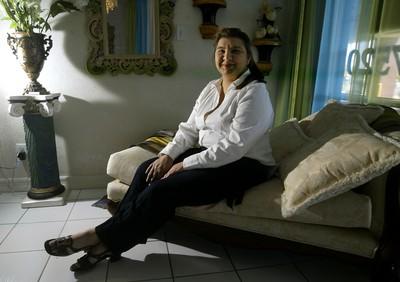TROUBLE IN CARDS
Debbie Marks can see your future by consulting the stars or her stack of gold-embossed Tarot cards.
At least she says she can.
Whether you believe she can truly foretell your fate depends on whether you're among the majority of Americans who believe in psychics. Some 60 percent do, according to a 2001 survey by the National Science Foundation.
But even Marks is having trouble divining what will become of her nine-month battle with Clark County to acquire a license to do business as a fortuneteller.
"I usually get this energy from the back of my neck, and then a flash, and I know," Marks, 38, said last week. "But I'm not getting anything on this. It's still cloudy."
The Las Vegan's quest since August to open up Goddess Salon and Psychic Readings in a Desert Inn Road strip mall has done far more than give her a headache and cost her thousands in attorneys' fees and lost revenue.
It has brought to light an apparently unconstitutional law on the county books and exposed a behind-the-scenes rift between police and county bureaucrats.
It also has left some county leaders asking why they didn't know more about this unusual case before it became the subject of a heated 30-minute public hearing at last week's County Commission meeting.
The hearing ended with commissioners postponing a decision on Marks' license application.
"This has certainly signaled that there's some problems with some of our procedures," said Commissioner Chris Giunchigliani, who represents the district where Marks is trying to open Goddess.
While some see psychics as frauds preying on the gullible, Southern Nevada municipalities issue business licenses to those wishing to set up shop as soothsayers.
Forty-three people hold Clark County government-issued licenses to do business as an astrologer, spiritualist, seer or other form of psychic.
Because psychics are in a position to potentially exploit citizens, government officials vet potential licensees as carefully as they do entrepreneurs seeking licenses to operate nursing homes and child care centers.
Applicants must submit to fingerprinting and a police background check that includes inquiries into credit histories and relatives.
But police contend Marks stymied their efforts to investigate her, refusing to schedule an interview with a detective and delaying being fingerprinted.
"The applicant was not forthcoming and cooperative for the investigation," Detective Stacy Rodd told commissioners at a hearing Tuesday.
Marks counters that she repeatedly tried to contact Toni Weeks, the police detective assigned to the case, to arrange fingerprinting, and referred Weeks' phone inquiries about her application to her attorney.
Police proceeded with their investigation without the interview, uncovering 10 "areas of concern," according to a confidential police report obtained by the Review-Journal.
Among the most serious concerns is a police assertion that Marks had used multiple Social Security numbers in applying for her license, utilities and the lease for Goddess.
Marks said she wasn't falsifying records and uses only her true Social Security number. She noted that the multiple numbers police found after running a credit check are similar. In one case, two numbers were transposed.
Weeks stated in her report that Marks also falsified her license application by stating she has never gone by any other names.
"I have found that she has used the surname of Evans," Weeks wrote, adding that she found the information through "comprehensive law enforcement records checks."
Marks said although her husband's name is Bobby Evans, she has never adopted his surname. She believes police have confused her with her sister-in law.
"In Texas, we lived with my husband's sister. Her name is Debbie Evans, so police would find a Debbie Evans who once had the same address as me."
Marks believes police have gone out of their way to find reasons for her application to be denied.
"I am glad police do these checks. I believe they protect people, and that anyone who can jeopardize a person physically, emotionally or spiritually should have them," she said. "But there was no reason to not give me a license, no criminal background, no fraud. And police were chalking me up as a bad apple."
Marks, a Romani, or Gypsy, felt she was being discriminated against.
She hired a second attorney to represent her, prominent Los Angeles civil rights attorney Barry Fisher.
"There were some persons from the Police Department on a fishing expedition against my client," Fisher said. "Police just kept coming up with more and more abject curiosity-driven or prejudice-driven questions."
Rather than continue what had deteriorated into hostile dealings with police, Fisher began talks with the lawyers who provide counsel to the county's Business Licensing Department.
"Our position is that these issues they were raising were irrelevant and unconstitutional," Fisher said.
Clark County code gives county commissioners great discretion in denying someone a psychic's license.
But fortunetelling has been recognized in numerous court decisions as a First Amendment-protected form of speech.
That distinction limits elected officials' discretion in determining who gets licensed.
"When there's First Amendment protection, it has to be objectively determinable criteria, not the subjective call of a politician based on police concerns," Fisher said.
Representing another psychic last year, Fisher persuaded the Las Vegas city attorney's office that their fortunetelling licensing code, which nearly mirrored the county's current law, was unconstitutional.
Deputy City Attorney Larry Bettis wrote in a March 2006 letter to Fisher's firm that Las Vegas would amend its code regarding psychic licensing "in recognition of their free speech rights protected under the Constitution of the State of Nevada and the First Amendment."
City spokesman Jace Radke said Thursday that the city is still in the process of rewriting the psychic licensing law to make it constitutional.
Eventually, county attorneys realized Fisher was right and that county law also needed to be updated to be constitutional.
Still, Fisher worked with county attorneys over several months to address the concerns raised by police.
"We could've taken a hard line, but instead we painstakingly dealt with everything they threw at us," Fisher said.
Earlier this month, after consulting with county attorneys, Business Licensing Director Jacqueline Holloway moved Marks' application forward to county commissioners with a recommendation for approval.
However, Holloway left commissioners in the dark about police objections to Marks' application. Holloway also set the application up to breeze through the approval process without scrutiny. She had the Marks application placed on Tuesday's consent agenda, which consists of dozens of items considered routine that commissioners vote to approve with a single motion and without discussion.
Although department directors are tasked with briefing commissioners on items they place on agendas, Holloway did not tell commissioners about police concerns or provide them a copy of Weeks' report.
Giunchigliani had the item pulled off Tuesday's consent agenda for a full-hearing after learning police were calling for Marks' application to be denied.
"In my mind, it's very important what they (police) have to say. ... I would have liked to have been briefed," Giunchigliani said. "I didn't even have the background information, so I have some concerns about our procedures."
Weeks and Rodd then explained their concerns to commissioners, raising several of the same issues in the Marks police report.
They also disagreed with the assertion that fortunetelling is constitutionally protected.
"This is not a First Amendment issue," Rodd said, adding that police consulted with the 9th Circuit Court of Appeals in drawing that conclusion.
Afterward, Giunchigliani said from the dais that she was "bothered" that business licensing was recommending approval of Marks' license without airing the concerns raised by law enforcement.
Holloway told commissioners her department worked closely with police, but disagreed with their conclusion.
"We determined that the issues they raised did not rise to the level of a denial," she said. "We communicated our position to Metro on a number of occasions."
Rodd confirmed police were in contact with Holloway's office, but told commissioners talks ended when police found out Holloway had arranged for Marks' application to be approved without discussion.
Commissioners eventually voted to delay their decision on Marks' application until a future meeting, with Commission Chairman Rory Reid encouraging police and business licensing to work together on a joint recommendation.
"I don't know if we've ever been in a situation where Metro is recommending one thing and business licensing another," Reid said. "I don't think that's a position we want to be in."
County Manager Virginia Valentine said she was not aware of police concerns before Tuesday's hearing.
Asked if it was appropriate for Holloway to have placed the disputed matter on a consent agenda, Valentine answered no. "It's something I'll be talking to her about," Valentine said.
Holloway referred questions to county spokesman Dan Kulin. He said in light of what happened, the item should have been placed on the portion of commissioners' agenda where it would have been the subject of a hearing.


















